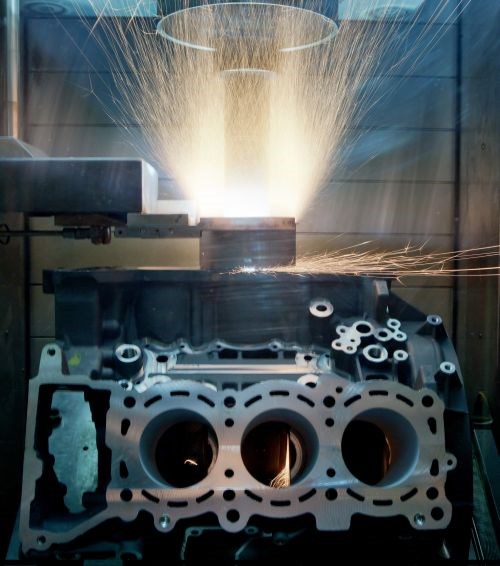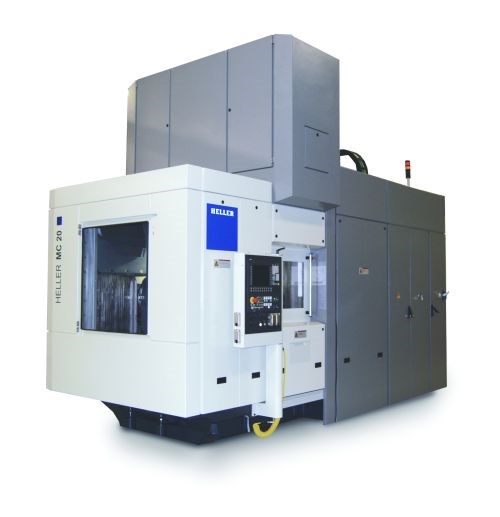On Display at “Technology Days”
The Nanoslide cylinder bore coating process and the MC20 horizontal machining module received a lot of attention at Heller Machine Tools' "Technology Days" open house event.
Share





Approximately 700 people visited Heller Machine Tool’s “Technology Days” open house event September 26 and 27 to peruse the builder’s latest equipment as well as offerings from 25 suppliers of tooling, metrology systems and other complementary equipment. Although a broad range of offerings were on display, the company highlighted two developments in particular: its new cylinder bore coating technology and a series of horizontal machining centers capable of both heavy and high speed cutting.
Nanoslide – Lighter engine block materials make for lighter cars and better fuel efficiency, but according to Heller, the most commonly used lightweight materials typically require cylinder liners to impart the necessary surface hardness, roughness and texture. The company says it now offers a cost-effective alternative: Nanoslide, a twin-wire arc spraying process based on research from Mercedes Benz and developed for full production by Heller, Daimler AG and other partners.
The process involves melting iron/carbon wires and using nitrogen gas to spray the material onto the interior surfaces of engine cylinders. Spray particle velocity ranges from 60 to 80 m/s, and spray particle temperatures range to 2000° C. Compared to traditional liners, the process reduces engine weight; reduces friction between the liner, piston and ring; and improves engine displacement and torque, the company says.
Nanoslide is also said to provide advantages over other thermal spray processes. Specifically, the company cites its high material deposit, use of wires rather than powder as feedstock material (wires are said to be easier to handle), use of fewer components, ability to coat without process control, and ability to coat without the need for extra cooling. However, the company emphasizes that parameters such as current, voltage, wire feed, and process gas flow must all be optimized.

MC Series HMCs - According to the company, the MC Series HMCs offer the flexibility to not only make heavy cuts in deep material, but also finish-machine the same workpiece in the same picture. Seven different sizes are available, and the series is said to be especially useful for automotive applications. Internally arranged drives and reduced table deformation are said to provide high precision and reduced machining times. Options include user-specified spindle size, spindle taper, tool magazine, and chip disposal; choice of gear-driven spindles for heavy or high-speed cuts; a range of optional extensions, including an out-facing slide with a coupling through the spindle center for NC turning; and more.
At the open house event, the company placed particular emphasis on one representative from the line: the MC20 machining module. This four- or five-axis HMC is designed to be adapted for different machining tasks, particularly flexible series production in automotive applications. Capable of wet, dry or MQL machining, it can be deployed as a stand-alone piece of equipment or for series production. It is suitable for materials ranging from aluminum to cast iron and steel. Four spindle options—two with HSK-A63 hollow-shaft tapers and two with HSK-A100 tapers—provide options for high speed or heavy-duty, high-torque cutting, respectively.
The tool moves via an X-axis traversing column and Y-axis vertical slide, while the worktable moves along the Z axis. Other elements of the machine’s basic architecture include a tool magazine mounted directly above the main spindle, workpiece loading from the top or front, X-axis stroke of 800 mm, Z-axis stroke of 800 mm (+ 200 mm for loading), and Y-axis stroke of 750 mm. The bed carries two linear guideways with pre-loaded rolling elements and thermo-symmetrically-mounted measuring scales for both the traversing-column X axis and the bridge-type Z axis, which is available with one or two drives. The A axis is designed as a swivel traverse in L-form or in optional U-form. All linear axes are driven by digitally controlled, fully enclosed synchronized AC motors, and power transmission is through pre-loaded, recirculating ballscrew drives.

Be sure to keep an eye on upcoming issues of “91ĘÓƵÍřŐľÎŰ” for possible further news on these and other developments from Heller.
Related Content
Navigating Large-Scale CNC Machining: Suburban Tool’s Niche Strategy to Stay Competitive
Facing increasing competition from lower-cost imports, Suburban Tool made a move toward large-scale, in-house machining. By identifying a niche in large, precision angle plates and tombstones, the company has strengthened its ability to control quality and protect its reputation.
Read MoreShop “Dims the Lights” With Pallets and More
Adding pallet systems brought Mach Machine success and additional productivity. The shop has since furthered its automation goals while adding new capabilities.
Read MoreHurco Machine-Tending Solutions Support Range of Machining Centers
IMTS 2024: Hurco is demonstrating the capabilities of machine-tending automation through ProCobots-Hurco integration. The company is also showcasing a range of CNC machines.
Read MoreWeingärtner Maschinenbau HMC Provides Stable Machining
The MPMC features a wide base, optimized guide ratio and configuration of the guideways to provide stability and prevent vibration during operation, even under extreme cutting conditions.
Read MoreRead Next
AMRs Are Moving Into Manufacturing: 4 Considerations for Implementation
AMRs can provide a flexible, easy-to-use automation platform so long as manufacturers choose a suitable task and prepare their facilities.
Read MoreLast Chance! 2025 Top Shops Benchmarking Survey Still Open Through April 30
Don’t miss out! 91ĘÓƵÍřŐľÎŰ's Top Shops Benchmarking Survey is still open — but not for long. This is your last chance to a receive free, customized benchmarking report that includes actionable feedback across several shopfloor and business metrics.
Read MoreMachine Shop MBA
Making Chips and 91ĘÓƵÍřŐľÎŰ are teaming up for a new podcast series called Machine Shop MBA—designed to help manufacturers measure their success against the industry’s best. Through the lens of the Top Shops benchmarking program, the series explores the KPIs that set high-performing shops apart, from machine utilization and first-pass yield to employee engagement and revenue per employee.
Read More























